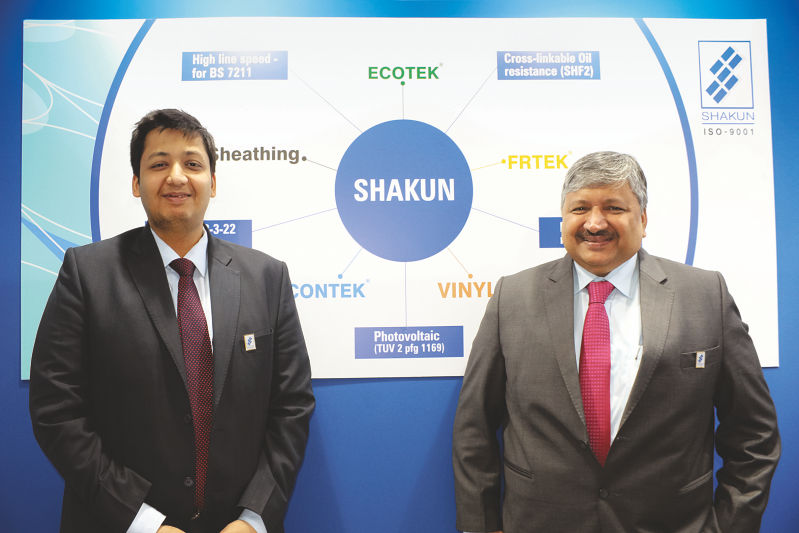Growing at consistent growth rate of 15 percent for 30 years, Shakun Polymers’ export is sizeable with uninterrupted additions in its product-mix and capacity over time.

Mr. Anirudh Bansal, Business Development, Shakun Polymers Limited (Left)
Shakun Polymers Limited, established in 1991, has carved a name for itself in the field of compounding for the wire and cable market. With a total installed capacity of 36,000 tonnes, its plants are not only equipped with modern compounding lines, but it spends a sizeable amount on R&D for constant product development process.
Shakun product line comprises of halogen-free flame retardant compounds, PVC based flame retardant compounds, TPR/PVC compounds, black polyethylene compounds, and semi-conductive compounds. It has a strong customer base worldwide and its products have been appreciated for their matching global quality benchmarks. The company commenced its export operations in the year 2003 and has been designated as a Two Star Export House by the Government of India.
The company is aiming to increase its total capacity, especially in semi-conductive compounds, which is on card to be executed immediately. A new line for halogen-free flame retardant has been recently added and would commence the production by the end of April.
During Wire 2016 show, Wire and Cable India hosted a brief interaction with Mr. Rakesh Bansal, Director, Shakun Polymers Limited and Mr. Anirudh Bansal, Business Development, Shakun Polymers Limited to get to know their immediate priorities on product development, market reach, and capacity additions.
Wire & Cable India: To start with, what’s new happening at Shakun?
Rakesh Bansal: Shakun has been growing at the rate of 15 percent consistently for past two decades. We have not been only able to maintain the growth rate, but also able to ensure that whatever we remain sustainable, something which we can take forward.
WCI: Are there any recent product launches, or any product to be launched soon?
RB: We have recently launched halogen-free flame retardant cross linkable solution on SHF2. We are among the few select companies to have done so. This is moisture curable, halogen-free flame retardant compound, which has increasing demand from shipboard, mining, refineries, metro, and other related cable segments.
WCI: Your future plans?
RB: Our focus is to increase the capacity of semi-conductive compounds, which is currently at a capacity of 10,000 tonnes, to which we are hoping to add 10,000 tonnes more, thereby doubling the capacity. The decision on this shall be taken this month, or the next month at the latest. In the semi-conducting materials, we are actually short of required capacity to address the demands in a way we desire.
On the halogen-free front, we have already increased the capacity recently and we hope it will be up and running by April end. The capacity has been taken up to 16,000 tonnes from existing 12,000 tonnes. We foresee a change happening in halogen-free once the BIS standards are in place; I definitely see an increased demand for halogen-free compounds.
WCI: You are also participating in a lot of awareness programs. What are your observations about the acceptance level of halogen-free in the Indian wire and cable industry?
RB: As far as, cable producers are concerned, they are now fully aware of the halogen-free compounds and its advantages. They are pretty appreciative of the developments happening in the realm of halogen-free flame retardant compounds. However, at the moment, the biggest deterrent is the legislation, i.e. the BIS part. Basically, the industry is ready in all respect; once the legislation is put in place, the industry would move forward.
WCI: When do you think the legislation will come in?
RB: Soon, I would say! We are not far off; it should happen within one year time.
WCI: Tell us briefly about the markets you serve?
RB: Our major focus has been the Middle East market, and we cover it from UAE and Saudi Arabia to Kuwait and Egypt. We also export a small portion to South America. Of late, some parts of Northern Africa and South Africa.
WCI: As part of R&D and product development, what does Shakun do to make its products cut above the rest?
RB: We don’t do any ‘molecular’ level detailed R&D, I would say. Our R&D is related to product development and we have a competent team of chemical experts from different nations, viz. Italy and Germany. They do a lot of work on the product development; presently their most of the work is dedicated to halogen-free flame retardant compounds, where we have huge competitive advantage. The product we have churned out is really among the best in the industry. One unique feature of such products is being crack-resistant. Ambient conditions in India and the countries we export are very challenging and all our products are developed keeping in view such harsh conditions.
We have done pretty well in R&D if seen from the product development view-point. Shakun never shy away from investments in R&D as these are soft investments quite needed by the industry we operate in, i.e. the compounding industry. I have often found people dithering over the decision to make soft investments, though they may quickly agree to invest in machineries and hardware. Our decision to go ahead with such investments has helped us immensely in growing our product-mix.
Besides, we also have a good sales tem comprising of people from different linguistic and cultural stocks, for example, a group of Egyptian personnel working for the Middle East market with an expertise in the regional languages and cable technologies. We hire people based on the merits required to market our product, irrespective of religion they follow and their nationality.
WCI: Mr. Anirudh, as a young entrepreneur who has recently joined the Industry, give your perspective on the industry. And, tell us also your long-term strategy for the company.
Anirudh Bansal: I have recently joined the company and am closely observing the industry to gobble up as much information as I can to take it forward. As of now, let us say, I am just going with the flow and trying to get hold of the compounding market, being in the business development. So far, my observations about the industry are that it is tough, quality has to be very good, and prices should be competitive at the same time in order to survive.
My long-term focus area would be innovation and exploring something new always for the product-mix to be always up-to-date and vibrant. For example, my personal inclination is diversification towards solar, which is looking extremely promising awhile. As you know, India is putting a lot of thrust on solar energy; so definitely, I would like to go on that tangent and take the company along.
WCI: Your view on the Indian companies, and competition from multi-nationals.
RB: When we started business, we use to be much afraid of multinationals coming in and taking away our businesses. But now, when I meet some of my fellow friends, I find that they have done quite well in whatever industries they are in. Indian companies and entrepreneurs have taken the competition head-on and now multinationals find it very difficult to put a strong foot in the Indian business arena – be it a new start-up or an established company, multinationals always expect a hard competition. So, I see a bright future for the Indian companies.
WCI: Your experience at Wire exhibition?
RB: We have a strong footfall here. We have already received most of our customers from Iran, South America, and the Middle East. Our sales team and R&D guys are here and are interacting with people to generate new ideas. We are really enjoying here!
WCI: Mr. Anirudh, would you like to add something?
AB: I wish to only add that I am really grateful to be part of Shakun and looking forward to putting all my efforts and taking the company to new heights. I also hope to treble the current capacity of 36,000 tonnes in time and taking it to whole different level.



